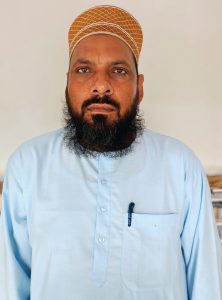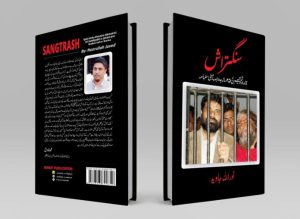
By Mohammad Waliullah Qadri,
Teacher, Government Inter College, Chapra, Bihar
The book Sang Tarash is not a collection of stories or ghazals. It is, in fact, a vivid chronicle of twenty-five years of tireless struggle by a selfless servant of Urdu—Shamim Ahmed, known today as Qaid-e-Urdu.
As one reads, Shamim Ahmed’s revolutionary personality shines among the greats of Urdu, while for the younger generation of contemporary Urdu he emerges as a guide and leader. For the reader, his life becomes the living embodiment of Iqbal’s verse:
یقین محکم ،عمل پیہم محبت فاتح عالم
جہاد زندگانی میں ہیں یہ مردوں کی شمشیریں
With firm faith, with ceaseless struggle, with love that conquers the world—
These are the swords with which one wages the battle of life.
The compiler of Sang Tarash, Noorullah Javed, has prepared this collection with great sincerity, good taste, and dedicated labor—an effort that is truly praiseworthy. From the very first glance at the book it becomes evident that Shamim Ahmed’s services to Urdu, and to humanity as a whole, have been acknowledged and praised by people of every field of life.

Among the political figures who have recognized his struggle are former Union Minister Mani Shankar Aiyar and former Rajya Sabha member Mohammad Adeeb. From the circle of religious scholars, Mufti Mukarram Ahmed (Shahi Imam, Fatehpuri Masjid, Delhi), Maulana Tauqeer Raza Khan Barelvi, Maulana Israrul Haq Qasmi, and Maulana Anisur Rahman Qasmi have expressed their appreciation. Literary stalwarts such as Padma Bhushan Prof. Akhtarul Wasey, Prof. Gopi Chand Narang, Prof. Maula Bakhsh Aseer, Dr. Mohammad Ehsan, and Dr. Imtiaz Waheed have also contributed their glowing tributes.
But the circle of admirers is not limited only to the Urdu world. Hindu leaders like Vijay Chaturvedi Yogi and Swami Shravanand Saraswati, Christian leaders like Archbishop Thomas D’Souza, and spiritual figures like Swami Lakshmi Shankar Acharya—all have written in acknowledgment of Shamim Ahmed’s services. This makes one thing very clear: sincere service to humanity transcends the barriers of caste and creed, and its reward is visible even in this temporary world. The opinions expressed by former Chief Justice of the Sikkim High Court, Dr. Justice R. Patra, and Justice Rajesh Tandon, further show the wide recognition of his contributions.
Mani Shankar Aiyar writes in Sang Tarash:
“Shamim Ahmed is a revolutionary personality. He has dedicated his life to the service of the poor and to fighting for their rights. People like him are the true gems of our society. They give us strength, they give us courage to live. Today, slogans of human rights remain only in books, but Shamim Ahmed has brought the struggle into the real field of action.”
Swami Lakshmi Shankar Acharya writes:
“I met Shamim Ahmed in Delhi, at a time when he was struggling to get Urdu recognized as the second official language. I too participated in his hunger strike. It is the result of his tireless efforts that Urdu was recognized as the second language in West Bengal. Shamim Ahmed may have been born in the land of Gandhi, but he has made the entire nation his field of action. He has carried forward the message of humanity, which is the first and foremost religion of mankind.”
My personal connection with Shamim Ahmed goes back to more than a decade. In April 2013, he came to Samastipur to participate in a grand Urdu conference, where I too was present. His personality left a deep impression on me. Afterwards, in Jamia Makhdoomiya, he graciously inaugurated my book Fazilat-e-Ilm-e-Deen. With the passage of time, I came to know that there is a family relation between us, which further strengthened the bond of respect and affection.
When Sang Tarash was published, and its release ceremony was held in Patna, I wished to read it. That wish was fulfilled in July 2025, when Shamim Ahmed came to Motihari for an Urdu seminar. I met him after a long time. At my request, he kindly presented me with this book as a gift, which I treasure.
After reading Sang Tarash, I found the answer to a question that had long been in my mind: what is it in Shamim Ahmed’s personality that makes him equally beloved and admired by everyone? Prof. Maula Bakhsh Aseer has explained it beautifully in his article:
“Born in the village of Imadpatti in Champaran district, Shamim Ahmed grew up in the shadow of Sufis. The environment of tolerance and inclusiveness instilled in him the urge to serve humanity. This is the reason why his entire struggle has been for humanity, without any distinction of caste or community.”
Prof. Imtiaz Waheed of Calcutta University writes:
“Shamim Ahmed belongs to the revolutionary land of Champaran, Bihar. This land has always been known for its hard work, honesty, simplicity, and struggle. Although he is from Bihar, the battlefield of his struggle has been Bengal, where he led the Urdu movement with unparalleled courage.”
The compilation of Sang Tarash is divided into different sections—essays, reviews, newspaper articles, and interviews. Collectively, these present a complete picture of Shamim Ahmed’s movement for Urdu, his fight for human rights, his services for communal harmony, and his dedication to the cause of humanity. One special aspect highlighted in the book is how he united Hindus, Sikhs, Christians, and Bengalis under the flag of Urdu rights. In doing so, he transformed the Urdu movement into a symbol of resistance against injustice and oppression.
Noorullah Javed, in the introduction, has correctly pointed out that Shamim Ahmed’s struggle was not motivated by livelihood or personal gain. Urdu is his mother tongue, and his love, loyalty, and faith towards it became the foundation of his struggle. It was precisely this sincerity that brought success to the movement.
The book also discusses in detail his efforts for communal harmony in West Bengal, his campaigns against domestic violence, his role as a human rights activist, and his simple yet powerful slogan: “Food for All.”
In short, Sang Tarash is not just a collection of tributes; it is a living document of the long and selfless struggle of Shamim Ahmed. It inspires, it informs, and it provokes thought. It establishes the fact that Shamim Ahmed’s name will remain permanently inscribed in the history of Urdu and in the struggle for human rights. Noorullah Javed deserves heartfelt congratulations for preparing this valuable compilation, and Shamim Ahmed deserves our gratitude for his services to Urdu, to humanity, and to truth itself.






